Categories
Tracking how much of the planned activity, progress, or goals have been completed is a crucial task in any project.
Why?
It enables project managers to allocate resources in a way that minimizes costs and maximizes value. Besides, it promotes efficiency and ensures a project is completed within the set time frame.
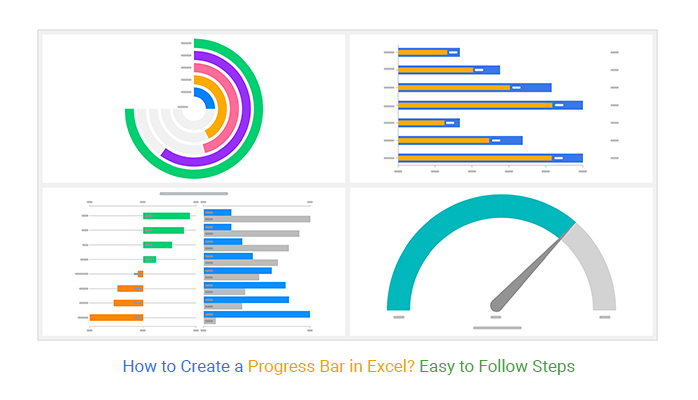
To track milestones achieved, you need the best charts in the business, which are Gauge Charts, Overlapping Bar Charts, and Radial Charts.
These Progress Bar Charts are amazingly easy to read and interpret, even for non-technical audiences.
So, how can you access a ready-made Progress Bar Chart in Excel?
Excel is one of the popular visualization tools among project management professionals. However, the Progress Bar in Excel is pretty basic, which means you have to spend more time editing it to fit your requirements.
You have an option of installing an add-in into your Excel to access ready-to-use and visually appealing work progress charts.
In this blog, you’ll discover:
Before jumping right into the blog’s heart, let’s define the chart.
Definition: Progress Bar in Excel is a visualization designs that display the progress made in a task, activity, or project. You can use these charts to monitor and prioritize your objectives, providing critical data for strategic decision-making.
Another effective way to visualize progress is through a Dot Plot, which offers a clear, concise view of individual data points along a scale or category. The Progress bar Excel uses filled bars to display how much of the planned activity or goal has been completed.
Different types of progress bar charts can be used for displaying progress. Charts shown in this blog are created by ChartExpo, which is a Chart Add-in for Excel.
An Overlapping Bar chart is best suited to comparing two distinct variables. An Overlapping Bar Chart is more valuable than a Stacked Bar Chart, especially if your goal is to display comparison insights.
The visualization design is similar to a standard Stacked Bar Chart. However, unlike a Stacked Diagram, its composite variables that contribute to the whole start at the baseline.
Besides, the chart requires three data columns or rows from your data set one for categories, one for the series in each category, and one for values.
The chart is more valuable than the Grouped Bar Chart because it uses color strategically to display comparison insights. Additionally, you can leverage the skills matrix to showcase insights into current progress against the benchmark.
A Gauge Chart is one of the most commonly used progress charts for visualizing progressive values. Besides, it’s also known as a speedometer chart.
The chart looks like a speedometer or a dial (in most cases) with a needle pointing to a certain value over the pivot point. The dial usually has different colors that divide the scale into several parts, similar to how an IELTS band score chart visually represents different proficiency levels.
The use of contrasting colors has profound effects on our brains, making it easier to identify ‘target’ and ‘achieved’ scores.
A Radial Bar Chart is a version of Progress Bar Charts plotted on a polar coordinate system rather than on a Cartesian one. A Radial Chart is also called a Circular Bar Chart.
This chart shares immense similarities with the multilayered Donut Chart. A version of the Classical Bar Chart. In other words, interpreting this chart is just as easy as getting insights from the Bar Visualization Designs.
Each bar on the outside gets relatively longer than the preceding one. In addition, each bar has a varying radius and angle.
Like a bar chart, the bars in this chart represent the changes in variables in your data. So the sizes of the almost circular bars depict the magnitude of change in variables. Let’s analyze the progress of the sales by the team using an easy-to-use chart maker.
This progress chart is specially provided by ChartExpo to use in Excel. You can see the results side by side, and also see the difference between them in the same visualization.

If the difference is positive, it will appear as green color, and if it is negative, it will appear as red color. These colors, sorting of data, and other properties are all customizable.
Have you installed ChartExpo add-ins for Excel on Mac as well as Windows? If no, then click on the link below and install it in your desired tool.
In the following video, you can learn how to create an Overlapping Bar Chart in Excel. You can use this chart to show the progress of different tasks and projects.
A Progress Chart is significant, especially in tasks that require continuous monitoring and evaluation. These charts use bars to show the growth of a variable under study.
To visualize your data using Progress Bar Charts, you need a tool. The best visualization tool should have the following attributes, namely:
To have a seamless experience in visualizing your data, you need a flexible tool.
The aesthetics of an online charting tool come in handy when choosing the right data visualization tool for your work. Yes, aesthetics may not have any functional value, but they add spice to your data stories.
A tool that allows you to collaborate with others is very handy, especially in the pandemic. It would help if you had a tool to share and collaborate with others in visualization tasks.
Keep reading because, in the coming section, we’ll be recommending the best Excel add-in you should download and install in Excel to access the ready-to-go Progress Bar Charts.
Besides, the add-on (mentioned above) meets all the attributes we’ve just highlighted above.
This guide will walk you through the process of creating progress bars in Excel:
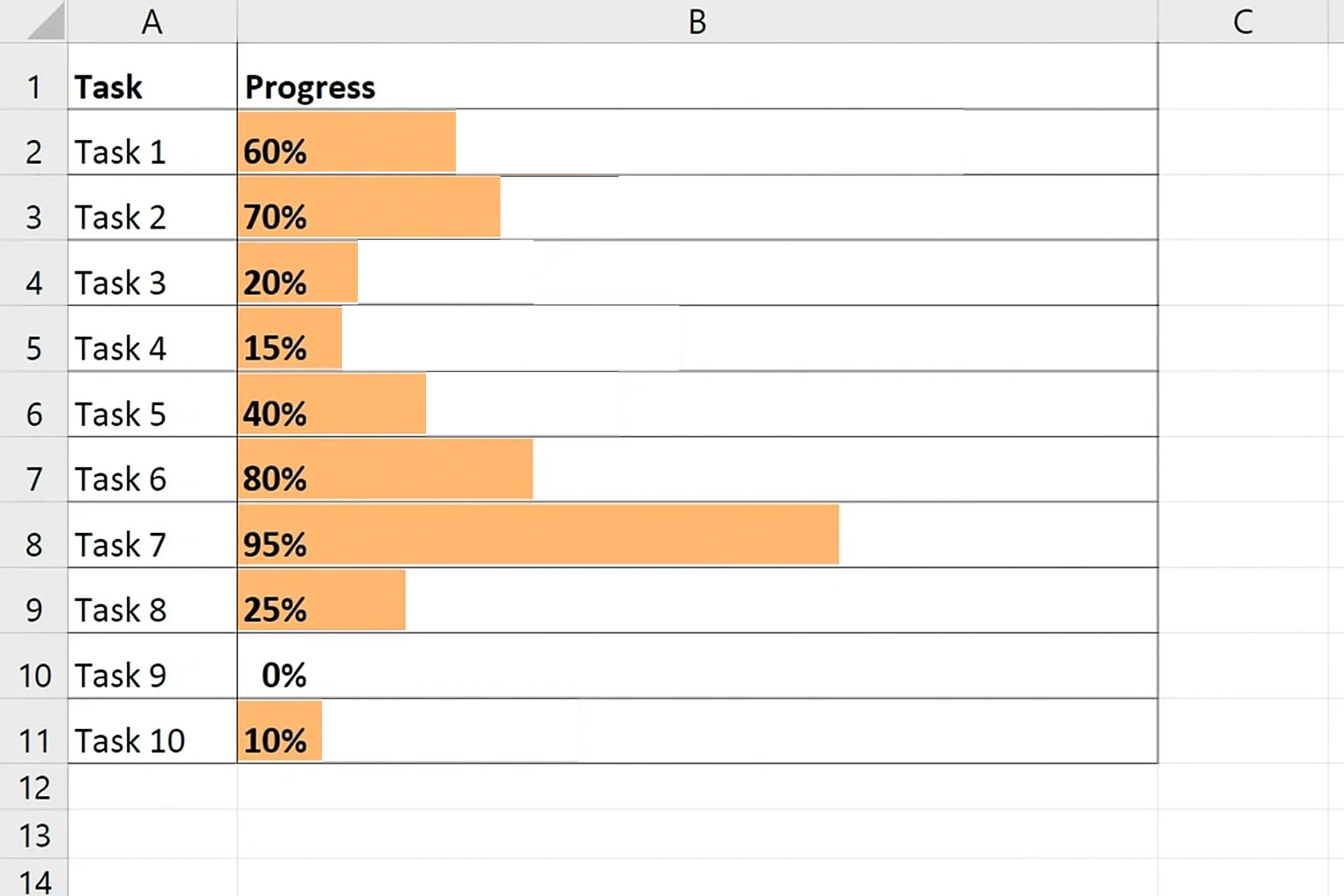
Start by entering data that represents the progress percentages for 10 different tasks.

Highlight the range B2:B11 where your progress percentages are stored. Then, go to the Home tab and click on the Conditional Formatting button. From the dropdown, select Data Bars, and then click on More Rules.
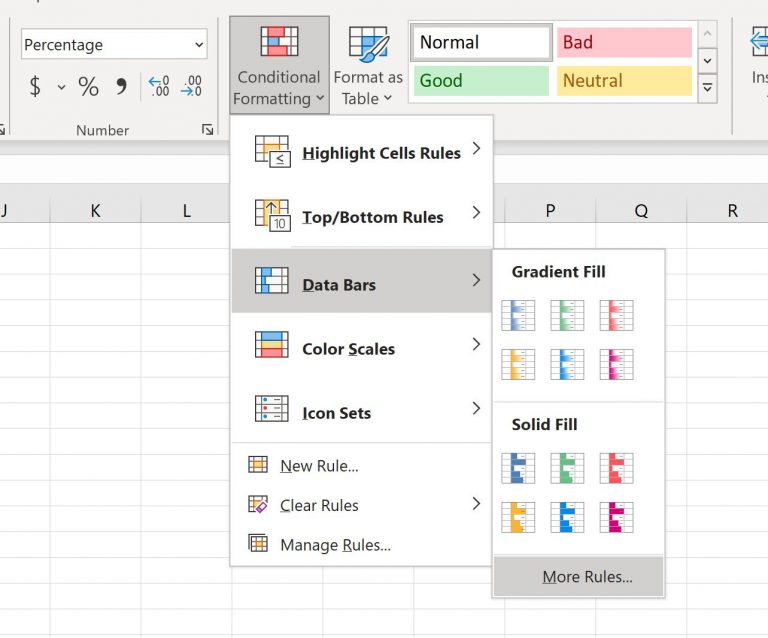
A window will pop up for further customization.
Choose a color for the bars (e.g., light green) and click OK.
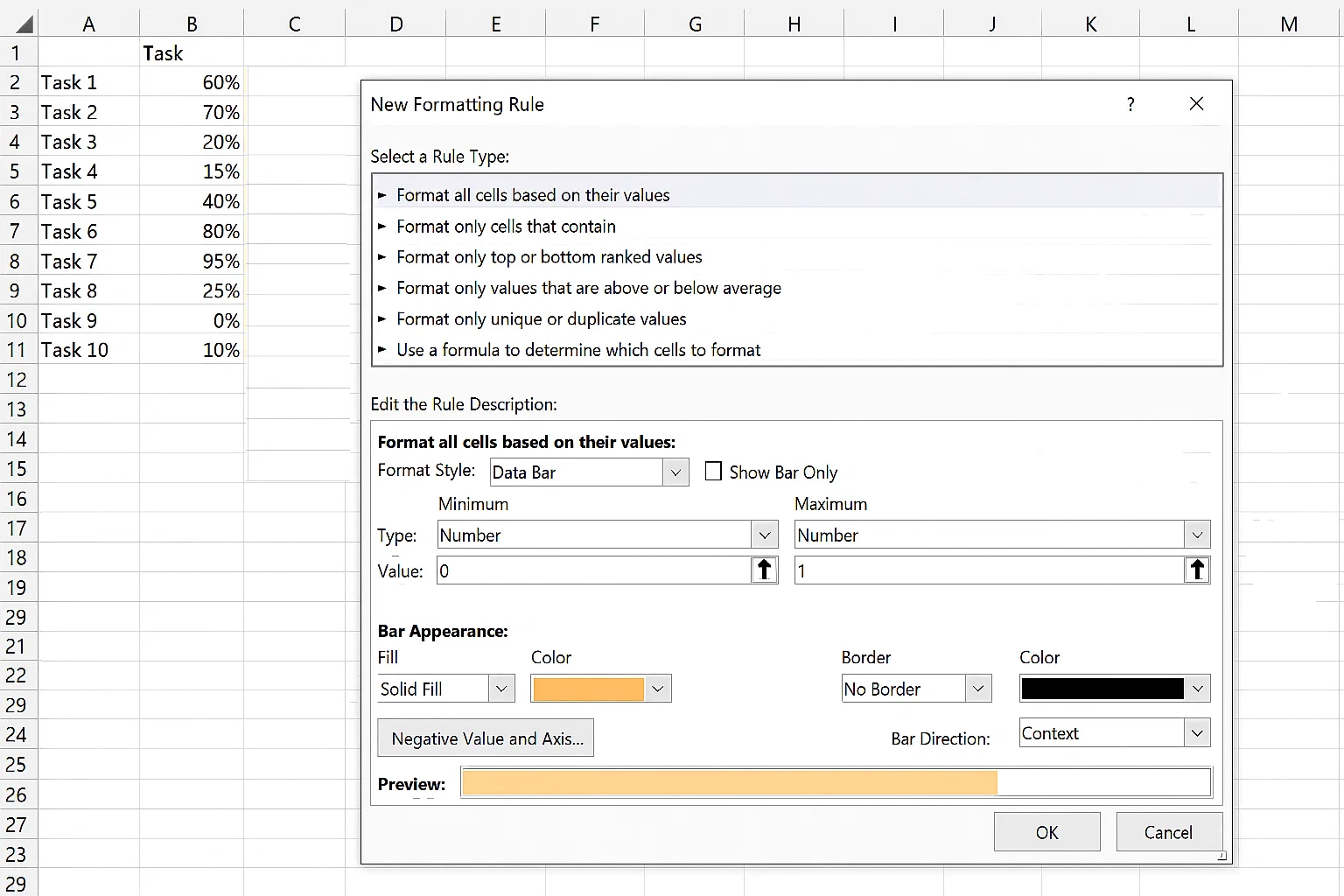
This will apply progress bars to each cell in column B.
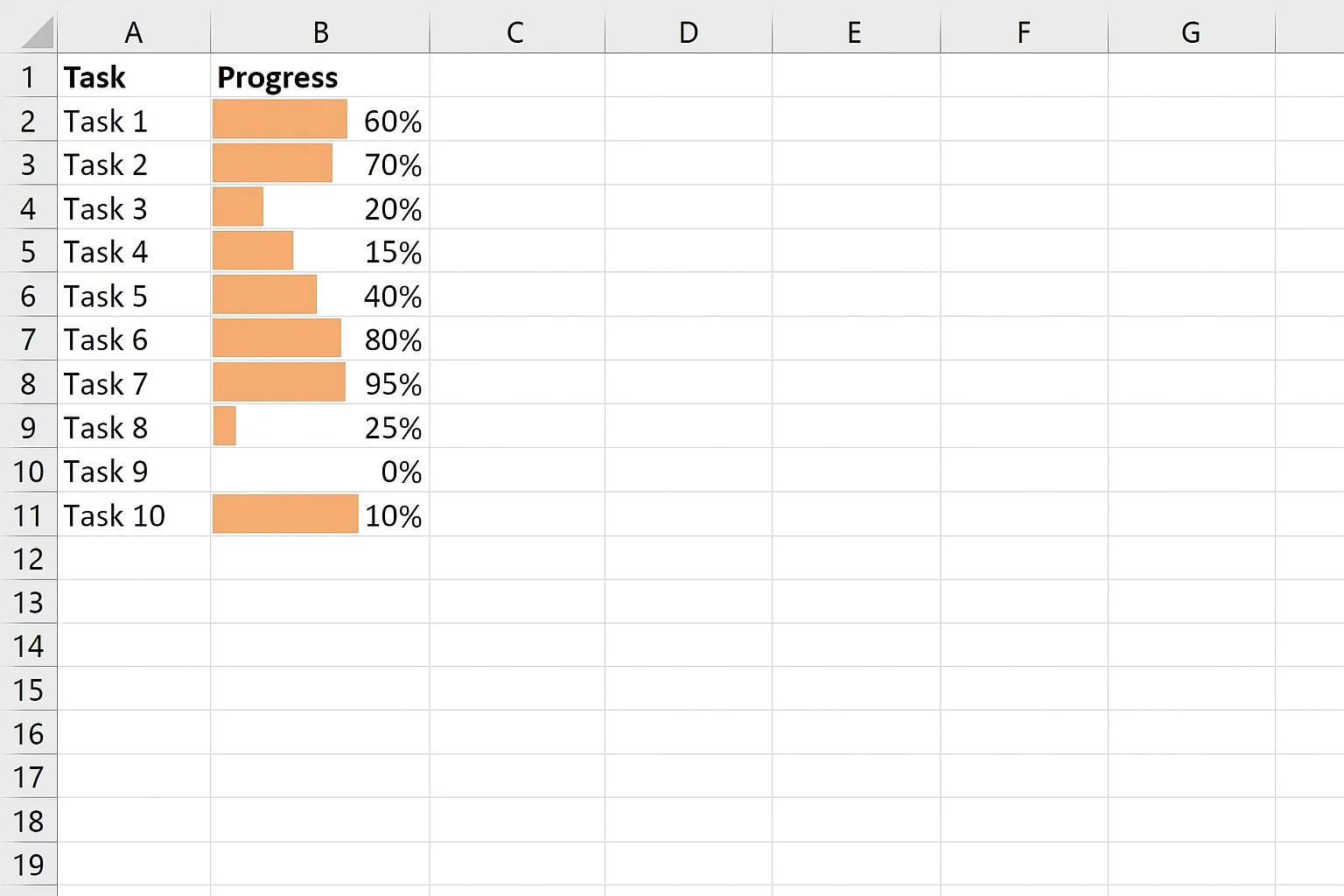
You can now adjust the column and row widths to make the progress bars more visible.
Additionally, you can add borders around the cells and align the percentage text to the left side for better clarity.
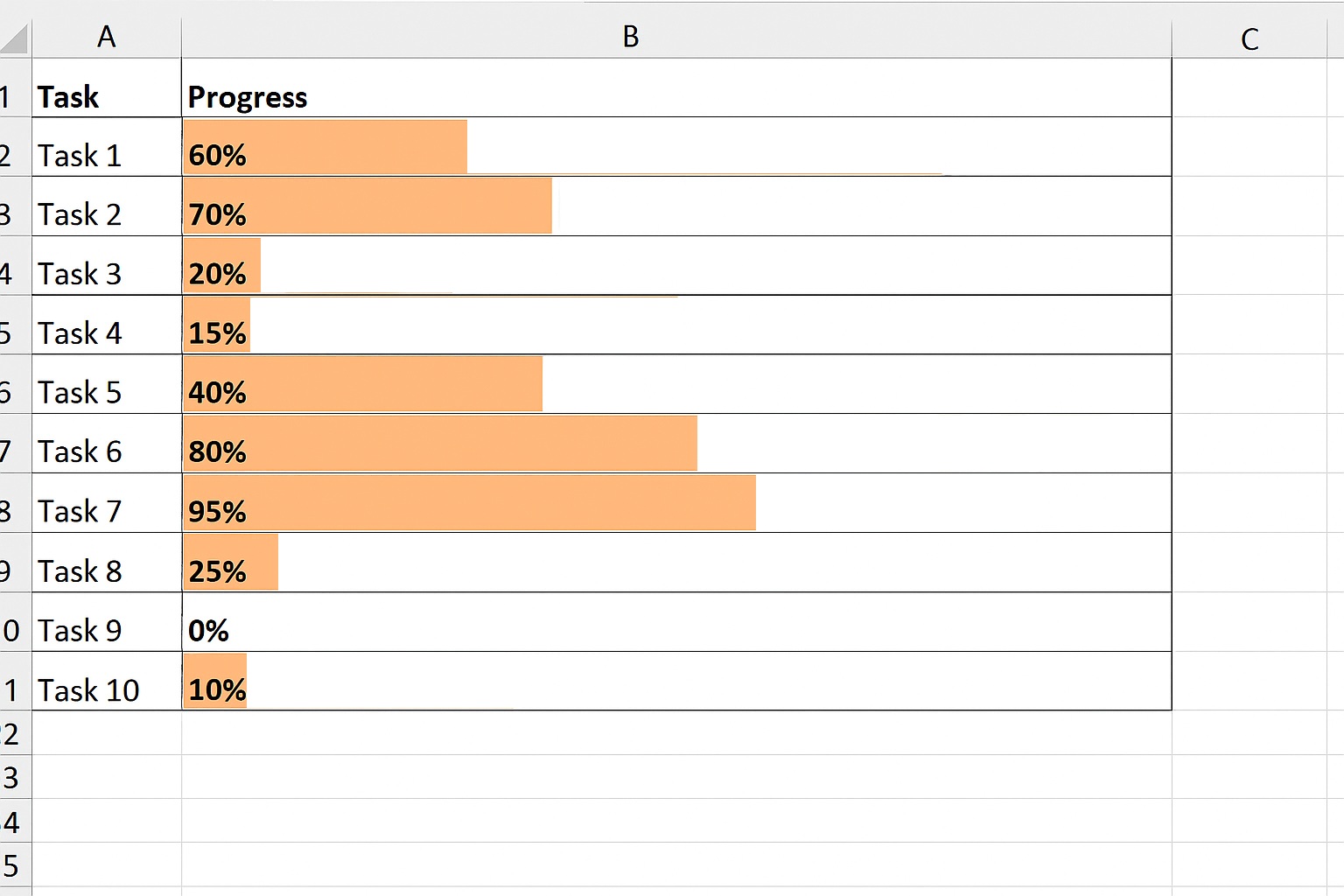
Whenever the percentage is updated, the length of the progress bar will automatically adjust accordingly.
Suppose we change the last progress up to 30%
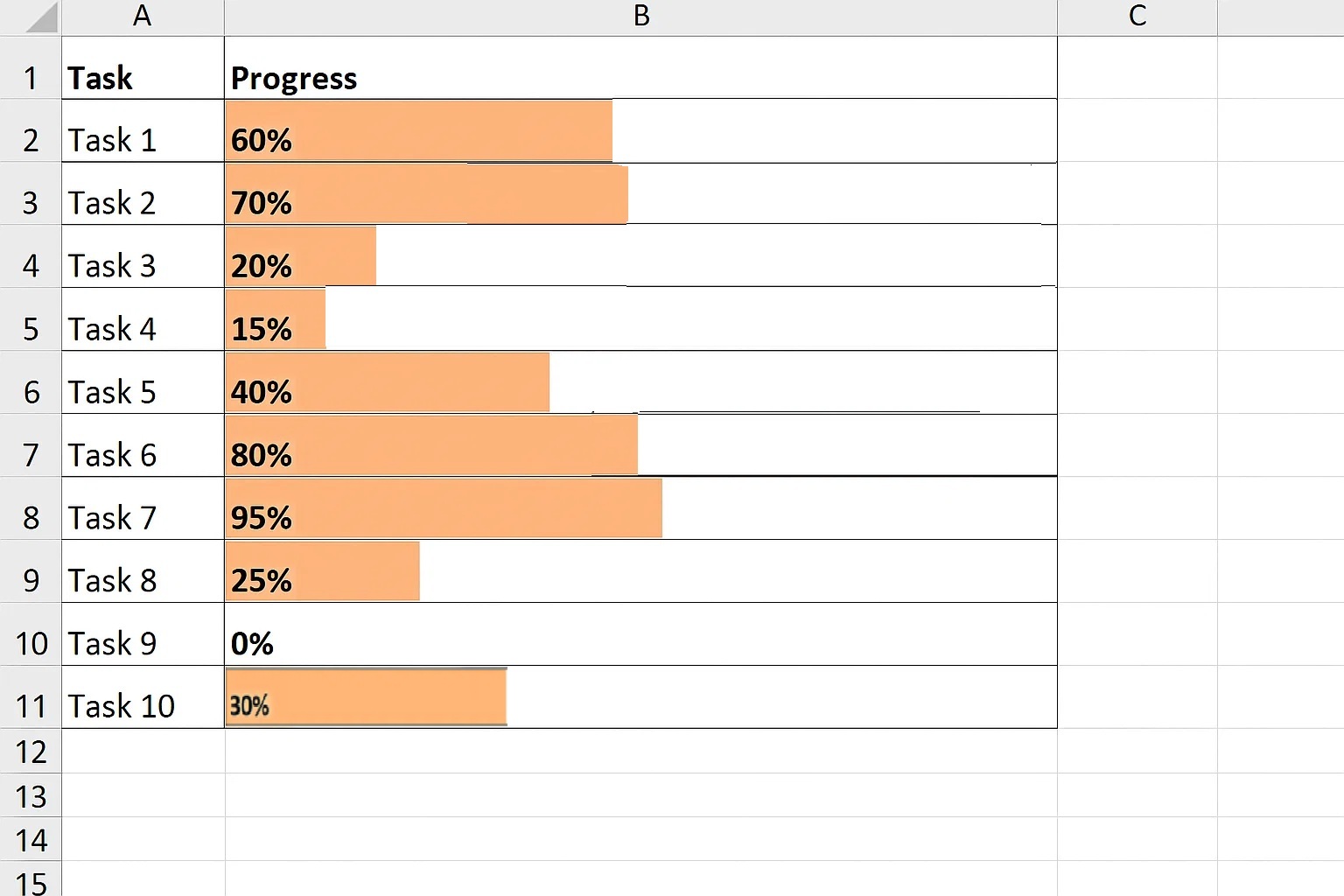
Excel does not natively support all types of Progress Bar Graphs. This means you have to plot the chart from scratch using other tools.
You have an option of installing a particular add-in called ChartExpo to access ready-to-use Progress Bar visualizations.
A Progress Bar in Excel, such as an overlapping bar chart or a Side-By-Side Bar Chart, uses different lengths and colors to track the pattern of variables. Its rectangular bars are oriented horizontally or vertically. One axis depicts categories, while the other shows numerical values related to two variables.
Take a look at the table below.
Can you provide meaningful insights by just taking a look at the table below?
| Projects | Expectation | Progress |
| Breeze | 100 | 66 |
| Point | 100 | 88 |
| Mecha | 100 | 60 |
| Synergy | 100 | 88 |
| Zen | 100 | 52 |
Note the difference after visualizing the data above.

ChartExpo is a data visualization tool that goes above and beyond data.
Using a complete set of tools (below):
You can easily create Work Progress Bar Charts that are simple, easy, and clear to read.
The tool comes with a library with many advanced charts and graphs. Did we mention you can easily export charts to make stunning social media reports, sales reports, and goal projections using a wide range of ready-to-go charts?
ChartExpo is for anyone who needs to create data visualizations and visual graphics for various purposes, such as blogs and reports.
But most of all, ChartExpo is for professionals and business owners who need to create beautiful Excel charts and graphs without design skills.
| Projects | Expectation | Progress |
| Breeze | 100 | 66 |
| Point | 100 | 88 |
| Mecha | 100 | 60 |
| Synergy | 100 | 88 |
| Zen | 100 | 52 |
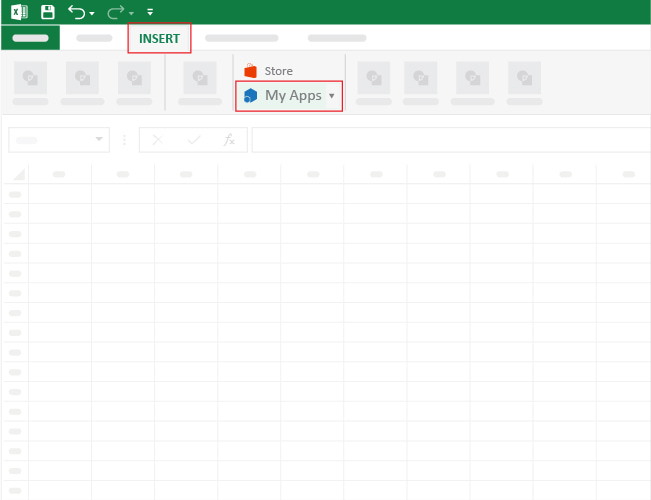
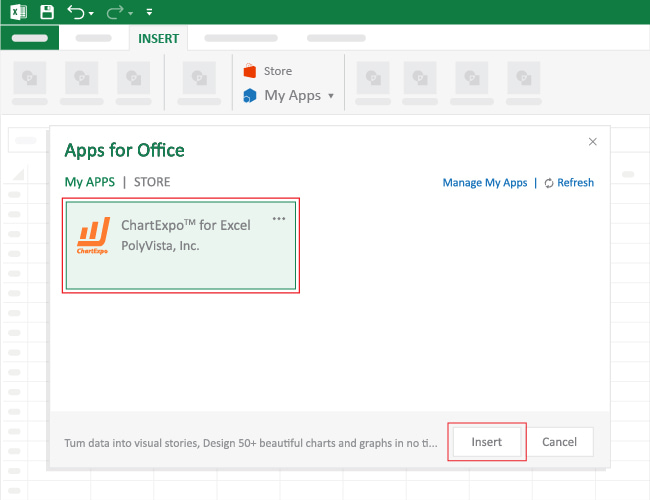

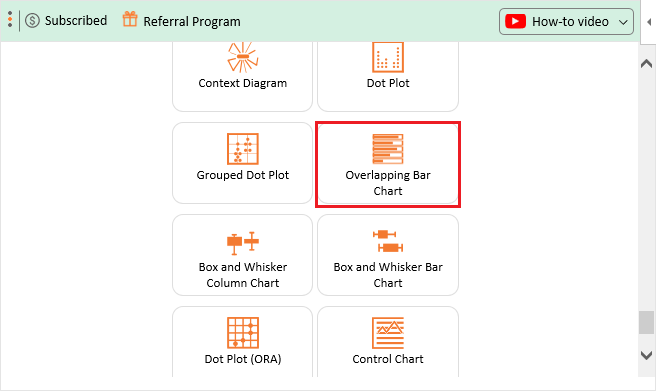
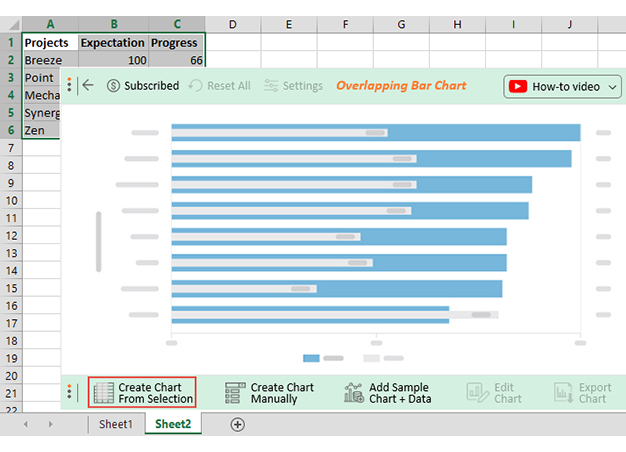

How to create Progress Bar Chart in Excel should never be a complex or overwhelming task. Use ChartExpo to create a Progress Bar Chart in Excel in a few clicks as shown above.
A title is one of the key pieces of information you need to help your audience understand the context of your data story.
To add a title to the Chart, follow the easy steps below:




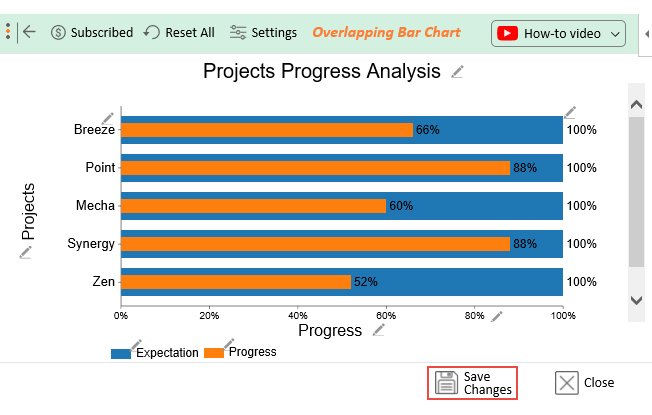

Now you have learned how easily you can show the progress of different projects or tasks in Excel.
Excel progress bars, usually made with conditional formatting or data bars, have restricted styling options. You can adjust colors and basic fill effects, but customizing shapes, gradients, or adding icons often requires complex workarounds or VBA.
Unlike dedicated project management tools, Excel does not offer a native, ready-to-use progress bar feature. Users typically have to build one manually using formulas and formatting, which can be time-consuming, especially for beginners.
In many cases, the progress bar depends on user-entered values or formula-driven percentages. If data changes frequently, you must ensure your progress bar updates correctly; otherwise, it can display misleading information.
For simple tasks, Excel progress bars work fine. But for more complex, multi-stage projects, they can’t automatically track multiple dependencies or update dynamically without advanced scripting. This makes them less reliable for detailed project tracking compared to specialized tools.
Adding too many conditional formatting rules or graphics-heavy progress bars in large workbooks can slow down Excel’s performance. This is especially noticeable when working with big datasets or shared files.
Excel progress bars are static visuals. Unlike dashboards in Power BI or other reporting tools, they don’t offer interactive drill-downs or automated status updates beyond what’s built with formulas.
Using a progress bar in Excel can visually enhance your data, helping track progress toward goals or project completion. Here are some best practices for creating effective progress bars:
Leverage Excel’s conditional formatting to create dynamic progress bars that change color based on progress. This makes it easier to visually assess progress at a glance.
Choose a range of data that accurately represents the progress you want to track. Whether it’s task completion, sales progress, or project milestones, ensure the data is aligned with the intended purpose.
Label each progress bar clearly with relevant information such as percentage completed or milestones achieved to make interpretation straightforward.
Avoid cluttering your progress bars with too many design elements. A clean, simple bar is often more effective and easy to interpret.
Ensure the progress bar is updated regularly as data changes. Manual updates can be time-consuming, so automate updates when possible using formulas or VBA scripts.
Double-check your formulas and data ranges to ensure that the progress bar reflects accurate and up-to-date information.
A Progress Bar Chart is a visualization design you can leverage to display the progress made in a task or project. The visualization design is best suited to monitor and prioritize your objectives, providing critical data for strategic decision-making.
It uses filled bars to display milestones achieved in a project.
Progress Bar Charts are amazingly easy to read and interpret. You can use the chart to track the milestones achieved against a particular target or deadline.
The visualization design uses a series of red and green bars to depict decline and growth, respectively.
Tracking how much of the planned activity or goals have been completed is a crucial undertaking in any project.
This is because it enables project management professionals to allocate resources to minimize costs and maximize value. Also, ensures a project is completed within the set time frame.
To track milestones achieved in a project, you need the best charts in the business, which is where the Progress Bar in Excel comes in.
Progress Bar Charts are amazingly easy to read and interpret due to their minimalist design.
So how can you access ready-made Work Progress Charts?
Excel should not be your go-to visualization tool if you want to leverage the chart for in-depth insights. The spreadsheet application lacks ready-to-use and visually appealing Stacked Bar Charts.
How to create Progress Bar Chart in Excel should never be a complex or overwhelming task.
We recommend you install third-party apps, such as ChartExpo, into your Excel to access ready-made and visually appealing Progress Charts.
ChartExpo is an Excel-based add-in with an insightful and easy-to-interpret Progress Bar Chart, plus many more advanced visualization designs. You don’t need programming or coding skills to visualize your data using the tool in your Excel.
Sign up for a 7-day free trial today to access ready-made and visually appealing Progress Bar Charts for your data story.
Related Article: